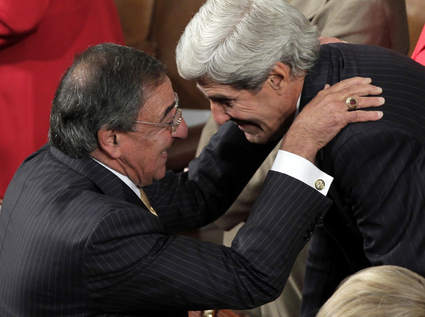In Pakistan, clash between army and protesters turns deadly

PESHAWAR, Pakistan — A deadly confrontation between Pakistani army troops and ethnic Pashtun protesters in a remote tribal region this weekend left at least three civilians dead, sparking a nationwide furor and marking a dangerous turning point in the growing conflict between the military and the country’s largest ethnic minority.
The incident Sunday came after months of rising antagonism between the military and the Pashtun Protection Movement, known as the PTM, which has been crusading since last year against alleged abuses of civilians during the extended military campaign against Islamist militants. The group’s leaders have been arrested at mass rallies and warned by the army to back off their anti-military crusade.
Military officials and Pashtun nationalist leaders, including a member of Parliament, gave sharply different accounts of the clash near a military post in North Waziristan, a tribal area near the Afghan border where the army has long battled armed extremists.
According to statements from the military press department, a mob of angry protesters attacked the army post after surrounding it and demanding the release of a man it described as a “suspected terrorist facilitator.” It said the troops tried to use “maximum restraint” but faced “direct firing” and responded with force, leaving three “attackers” dead. Ten protesters and five soldiers were injured, the department said.
But Mohsin Dawar, a national legislator from the PTM who participated in the protest and fled when the violence erupted, said in an online video posted from an unknown location Monday that he had seen 12 people dead and scores injured. He said that the crowd had been noisy but nonviolent and that the troops had fired “directly” into the rally. A second legislator, Ali Wazir, was arrested at the scene.
“The people were peacefully protesting against the torturing of their women by the security forces in a recent raid,” Dawar said. The group had come in a convoy of vehicles and crossed a military checkpoint. When he and Wazir arrived, Dawar said, the unarmed protesters began “chanting emotional slogans,” and troops “started firing straight at the protesters. . . . The military is lying.”
The conflicting accounts were difficult to verify because the military has since cut telephone and Internet service in the area and imposed a curfew in the tribal region’s central town.
Reports of Pakistani troops shooting unarmed protesters drew condemnation from domestic opposition leaders. Amnesty International, the London-based rights group, said in a statement that the government should immediately order an investigation. If the army killed protesters with live ammunition, Amnesty said, it would be a “serious violation of international law.”
But government officials condemned the protest leaders for inciting violence. The federal communication minister, Murad Saeed, said in a speech to Parliament that the protest was peaceful until an unnamed legislator arrived and urged people to attack the army post. He also criticized Dawar by name, accusing him of collaborating with the Afghan intelligence service.
Pakistan’s security forces enjoy widespread public popularity and are often praised for restoring security to the northwest region, after years of terrorist attacks and the two-year occupation of the bucolic Swat Valley by local Taliban fanatics who beat, bullied and hanged people in public.
Pashtuns constitute about 15 percent of Pakistanis and dominate the volatile northwest, where some have violently challenged the state and others have borne the brunt of military pressure. The PTM’s charismatic young leader, Manzoor Pashteen, has awakened national Pashtun anger with fiery speeches that denounce the army as the true source of terrorism.
More than any other ethnic minority, Pashtuns possess significant numbers and potential political clout, both in the mountainous tribal northwest and the teeming port city of Karachi 700 miles south, making their challenge to the armed forces a serious threat.
In a tweet Monday, Pashteen said the army had been using social media to “create the atmosphere” for its “cowardly attack” on the protesters. He said his movement would continue its “nonviolent constitutional struggle.”
The PTM has focused largely on individual cases of alleged disappearances and targeted killings by security forces, as well as other abuses. Dawar and Wazir, its national legislators, have raised issues of military abuse repeatedly in Parliament. Mainstream Pashtun political groups have kept a wary distance from the more radical PTM.
Constable reported from Kabul.


















You must be logged in to post a comment.